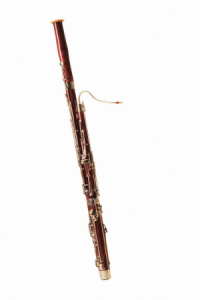Bassoons are one of the most expensive instruments in the orchestra outside of the piano.
Even a beginner bassoon can cost up to $5,000. And a professional bassoon will run between $20,000 and $30,000.
Part of the reason a bassoon is so expensive is that compared to many other instruments there are relatively few of them for sale.
However, the main reason is the design. A very large woodwind, bassoons are thus more difficult to manufacture.
In particular, the tone holes for the bassoon have to be crafted meticulously to be sure the pads do not leak any air. The crafting of these airholes is akin to a watchmaker like Rolex or Piaget crafting a watch. It’s not just an automatic process of putting a few pieces of wood together.
Table of Contents
- What Makes Bassoons Cost So Much
- How Much Does a Good Bassoon Cost?
- What Is The Most Expensive Bassoon?
What Makes Bassoons Cost So Much
- Manufacturing
- Materials
- Brand
The first thing is that bassoons are made predominantly us of maple wood. Hard maples from Europe predominantly. And hard maple woods are not cheap.
Manufactures don’t just put in an order for maple wood and hope for the best. For professional bassoons, especially, the manufacturer will send an experienced buyer to wood mills to pick just the right wood. In that manner, a bassoon resembles a high-model violin, where the wood is critical.
Once the hard wood arrives from the mill, the bassoon is sanded by machinery to produce the shape of the bassoon, and then hand-stained and varnished. And even the stain is not left to chance. Oil stains, normally linseed oil, are used so that they penetrate the wood but not too deeply. After the stain is dry, the bassoon body is further varnished to protect the wood.
Next is the producing of the tone holes. These must be produced with precision, and the various holes, groves and metal fixtures may take all day by a skilled craftsman to get right.
One of the challenges of producing a bassoon is that because of the design, the tone holes must be obliquely to the bassoon rather than perpendicular.
Also, the position of the keypads is critical as a single keypad can sometimes cover 3 tone holes.
The entire process from start to finish is one of perfection, and sadly, bassoons have less of a lifespan than other musical instruments as the playing of them consistently tends to warp the wood which affects the sound.
For old, and reconditioned bassoons, even as small a step as reoiling a bassoon can affect the sound. Swabbing your bassoon each time you’ve played it is of the utmost importance if you don’t want your bassoon to warp.
All of the above factors, from production to long term care, and the fact that compared to other woodwinds there are relatively few bassoons all adds up to the bassoon being an expensive instrument.
How Much Does a Good Bassoon Cost?
Plan on $7,000 to $12,000 for an intermediate bassoon. Meanwhile, expect to pay at least $20,000 for a bassoon of professional quality.
Due to the high cost of a new bassoon, and the fact the cheaper bassoons are made of plastic, there is an active market for buying and selling used bassoons. Why pay $7,000 for a plastic or composite bassoon when you can often snag a used one for $5,000.
Where To Buy Bassoons? | New & Used
What are the tips to deciding on a used bassoon? Fortunately, YouTube is to the rescue, and there is a great video on what to look for and what to avoid by going to.
By following these tips, you can avoid purchasing a defective or damaged bassoon or one that needs a lot of work by a trained bassoon specialist, and on the other hand, snag a great deal on a genuine maple bassoon that originally cost a whole lot more.
As is common in the used market for anything, sometimes people are desperate for money and it is possible to pick up a $15,000 bassoon for $5,000.
What Is The Most Expensive Bassoon?
Although there might be custom bassoons costing more, it’s generally agreed that the most expensive, modern manufactured bassoons are the Heckel bassoons, costing as much as $70,000 or more.
The good news is that you can often purchase a used Heckel for around $15,000.
